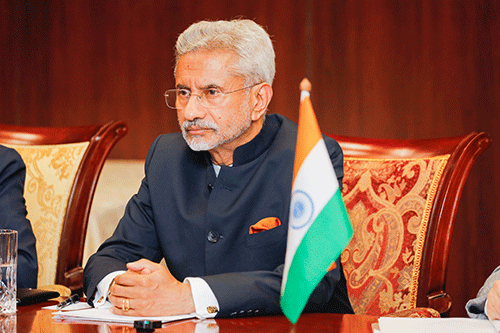Edward Mumbuu
Johnathan Beukes
India’s foreign affairs minister Subrahmanyam Jaishankar has refused to be dragged into a discussion around the arrest warrant hovering over Russian president Vladimir Putin’s head.
The outspoken diplomat, who was in Namibia on a state visit last week, in an interview spoke on a buffet of issues, ranging from India-Namibia ties, geopolitics and the BRICS bloc.
BRICS is made up of Brazil, Russia, India, China and South Africa. However, in recent months, interest in joining the bloc from other countries has reached fever pitch. Reuters reported that 19 countries expressed an interest in joining the group. Algeria, Argentina and Iran had all applied, while it is already known that Saudi Arabia, Türkiye, Egypt and Afghanistan are interested, along with Indonesia. Other likely applicants include Kazakhstan, Nicaragua, Nigeria, Senegal, Thailand and the United Arab Emirates.
However, over the past few months, one question has lingered: Will South Africa arrest Putin?
As a member of the International Criminal Court (ICC), South Africa would theoretically be expected to arrest Putin, it has widely been accepted. The ICC accused Putin in March of war crimes, including forcibly deporting children from Russian-occupied territory in Ukraine. Moscow vehemently denies the allegations.
“I am not even going there. We are not members of the ICC,” Jaishankar said with a smile. In the meantime, South Africa’s international relations and cooperation minister Naledi Pandor has said her country was mulling options if Putin came to the planned BRICS summit in Johannesburg, slated for August.
In the ongoing war, India has largely steered clear of who to back in the Russia- Ukraine conflict. Put to him point-blank what India’s stance is, he replied: “Prime Minister [Narendra] Modi has publicly declared that we don’t believe that in this day and age, conflict is the way to settle problems… we are for a negotiated way out. I don’t think it’s a question of taking the side of this country or that country. It’s a question of taking the side of peace.” Moreover, on the practical steps the Asian powerhouse has taken to resolve the war, he pointed to several interventions.
“We have been engaging both countries. But recently, prime minister Modi met president [Volodymyr] Zelensky when he was in Japan, and the bulk of the discussions went into what the Ukrainians call their peace plan. He’s also been in regular touch with president Putin. And I speak to my counterparts, but also to other countries,” he said.
Golden goose
It is an open secret now that Namibia is the talk of the global town. This is largely attributed to the recent oil discoveries and the country’s potential to produce the much-hyped green hydrogen.
“The predominant image of Namibia would still be that of a developing country with whom sharing experiences, building capacities, these things are used. And bear in mind that in different fields, we’ve actually had almost 1 500 Namibians go to India for some sort of capability-building.
Remember, we are globally the third-largest consumer of energy. We’re the third-largest economy in the world. In the coming years, we may probably be the second if you look at the energy market,” he stated, pointing to India as possibly one of the biggest markets for Namibia’s energy supplies. “Any new producer finds India of interest because India is among the new consumers. We find as a new consumer and a new producer what to do. India today has energy interests across the world. We’ve invested from Brazil to Sakhalin, and closer to you, we have really been big investors in Mozambique. So, our interests are both in oil and gas. Because Namibia has some natural potential for green energy, I’m pretty sure the Indian companies see a big energy relationship. I would say it’s in the realm of possibilities, but we’re not there yet. There’s a lot of talking,” he expounded.
This year alone, the Finnish president, US First Lady, and now the Indian foremost diplomat have all descended on the Land of the Brave. Cuban leader Miguel Díaz-Canel is also expected to visit Namibia in August.
BRICS
BRICS started in 2006. The leaders began meeting in 2009, and are heading for the 15th meeting this year in South Africa.
Jaishankar said he is often asked what this bloc does, and points to the coordination of policies on a variety of issues.
On the question of the possibility of increasing the size of BRICS and which countries would qualify, the diplomat observed that “there is quite an interest at the moment. To be very honest, that’s exactly the discussion that is going on within the room. So, the kind of questions we are talking about is, do we expand? If so, in what manner? We’ll have to wait and see what they will come up with.”
-emumbuu@nepc.com.na
-jbeukes@nepc.com.na


